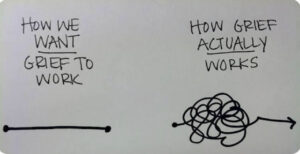
The human brain likes certainty and processes. And when it comes to moving through all of the emotions that come with the loss of a loved one, it’s no wonder that we can attach ourselves to the idea of stages of grief.
I know after a major loss in my own life, I headed to my first session of therapy with a few burning questions for my psychotherapist, “How long until I’m okay again? How many sessions? How many weeks/months? Just give me a ballpark idea. What do I need to do? Can you give me a checklist? Where is the fast forward button I can push?” It’s funny to me now when I think about what my therapist was likely thinking at the time. “Bless her heart, she has no clue!”
The first thing we need to do is establish what we are talking about when we talk about the concept of grief.
Grief is a natural response to loss.
It’s the emotional suffering you feel when something or someone you love is no longer there. Often the pain of loss can feel overwhelming. There can also be physical responses while grieving including loss of appetite, the ability to sleep well or even think straight. These are all normal reactions in grief, and more intense outcomes will typically accompany more significant losses. But in this article, we will just be focusing on the emotional responses.
You’ve probably heard of the five stages of grief: denial, anger, bargaining, depression and acceptance.
What you may not be aware of is that these stages were never originally meant to refer to the grieving process but rather to the person who is faced with their own pending death. They come from Dr. Elizabeth Kubler-Ross’ book On Death and Dying where she reports on her findings after interviewing people facing death. The five stages emerged based on how they coped.
There has since been much written about and debated within the bereavement profession around these ideas. And as I have discussed them with friends and the families I serve, I have found that there are three common myths that come up for people when they think about the stages of grief.
Myth #1: Everyone will at one point go through each stage after a loss.
Fact: Some may never go through one or more of the stages.
The son or daughter who has been watching a parent die slowly of a long-term illness may never move to anger but rather feel a sense of relief at their passing. Though some will experience a sense of disbelief, shock or numbness when a loved one dies, many won’t connect with the feeling of a sense of denial that their loved one is actually gone. Not all stages will resonate for all people in grief.
Myth #2: The stages are linear.
Fact: Some may very much feel that they move through the stages in order. First denial followed by anger, bargaining, depression and then finally acceptance. But the reality is that in the same way a person may not go through each stage, they also may not experience them in a neat and orderly fashion.
They could find that they bounce back and forth between a couple of them for awhile. They may feel like they are in a space of acceptance and healing, but then be shocked by a sense of depression that creeps up again 6 months later. This amusing diagram that was going around describes how grief actually works for many of us!

Myth #3: It will take approximately one year to move through each stage and then you will be healed.
Fact: Because each person’s grief journey is unique, there is no specific time frame for when a person will feel better.
Plus the reality is that there may never be a sense of feeling “all better”. I like the analogy I heard once about the loss of a close loved one feeling like the loss of a limb. You may not always feel the searing pain of when you first lost your arm or leg. However, you will need to learn how to live and move through the world differently now for the rest of your life without it.
As for a time frame, unfortunately we can’t predict that either. Some have said “one year” because the first year can be the most difficult with all of the first birthdays, anniversaries, holidays, etc. passing without the loved one physically there. But I’ll never forget what my friend told me after she lost her husband.
She said, “I found the second year after John died to be harder than the first. In the first year, I was expecting all of the ‘firsts’ to be hard. I didn’t anticipate the second year to be so hard.”
Again, this was her experience, and it may not be yours or someone else’s. Each unique person will go through their unique loss differently.
So what are some of the things that CAN help ease the pain of grief?
A couple of the things I’ve heard from people over the years include the following:
- Crying and expressing in other ways that your body asks
- Talking openly to a friend
- Individual grief therapy
- Grief groups
- Regular exercise, good nutrition and good sleep hygiene
- Journaling thoughts and feelings
- Spending time in nature
- Seeking spiritual support through your faith/religion/worldview
- Talking to your loved one who has died (out loud even!)
- Asking friends and family for what you need
- Receiving help that is offered
- Overall self-compassion – especially on the harder days
This is by no means a complete list, and we would love to hear from you. What are the things that have helped bring a sense of comfort for when you’ve experienced loss? Feel free to comment below.
While we know there are no “5 stages” or “12 steps” to gain perfect closure on grief, we can focus on the ways that work for us as we begin to move forward towards hope and healing.






Thank you so very much for helping me help myself feel normal as I grieve the recent death of my beloved mother. Debunking the 5 stages of the Kubler-Ross model have facilitated my understanding that mourning is not a problem to be hidden in the attic of my confused mind and that my pain over loss is my normal reaction. Thank you for helping me to begin to understand .